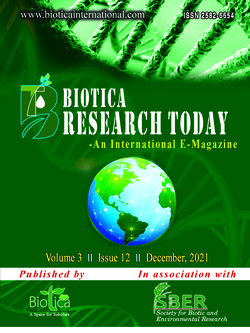
Millets: God Gifted Nutrient Rich Food Crops
Pankaj Kumar*
College of Forestry, VCSG UUHF, Ranichauri, Uttarakhand (249 199), India
Santoshkumar Magadum
Regional Sericultural Research Station, Central Silk Board, Miran Sahib, Jammu (181 101), India
DOI: NIL
Keywords: Macronutrients, Micronutrients, Millets, Nutrition
Abstract
Millets are considered as god gifted crops due to the nutrient content and their benefits on human health. Different types of millets includes finger millet, barnyard millet, proso millet, foxtail millet, little millet, kodo millet, pearl millet and sorghum. Millets have high amount of nutrients including protein, fat, starch, ash, crude fiber, dietary fiber and carbohydrate. These minor millets also contain high content of the minerals also such as calcium, phosphorus, iron, magnesium, sodium, potassium, copper, manganese and zinc. Other than the nutrients and minerals these crops have sufficient amount of thiamine, riboflavin, niacin etc. Previously these crops were known as poor man crops but now called as nutri-cereal crops. These minor millets have many health beneficial properties such as reducing cholesterol, controlling diabetes, weight loss, increases bone strength, increases digestion etc.
Downloads
not found
Reference
Chandra, D., Chandra, S., Pallavi, Sharma, A.K., 2016. Review of Finger millet (Eleusine coracana (L.) Gaertn): A power house of health benefiting nutrients. Food Science and Human Wellness 5, 149-155.
Lal, M., Vignesh, S., Kumar, V., 2021. Breeding for Biofortification: Achievements and Importance. Biotica Research Today 3(11), 1002-1004.
Satankar, M., Patil, A.K., Kautkar, S., Kumar, U., 2020. Pearl Millet: A Fundamental Review on Underutilized Source of Nutrition. Multilogic in Science 10(34), 1081-1084.
Sharma, S., Sharma, N., Handa, S., Pathania, S., 2017. Evaluation of health potential of nutritionally enriched Kodo millet (Eleusine coracana) grown in Himachal Pradesh, India. Food Chemistry 214, 162-168.
UNICEF/WHO/World Bank Joint Child Malnutrition Estimates, 2021 Edition. Available at: https://data.unicef.org/topic/nutrition/malnutrition/. Accessed on 02/12/2021.
